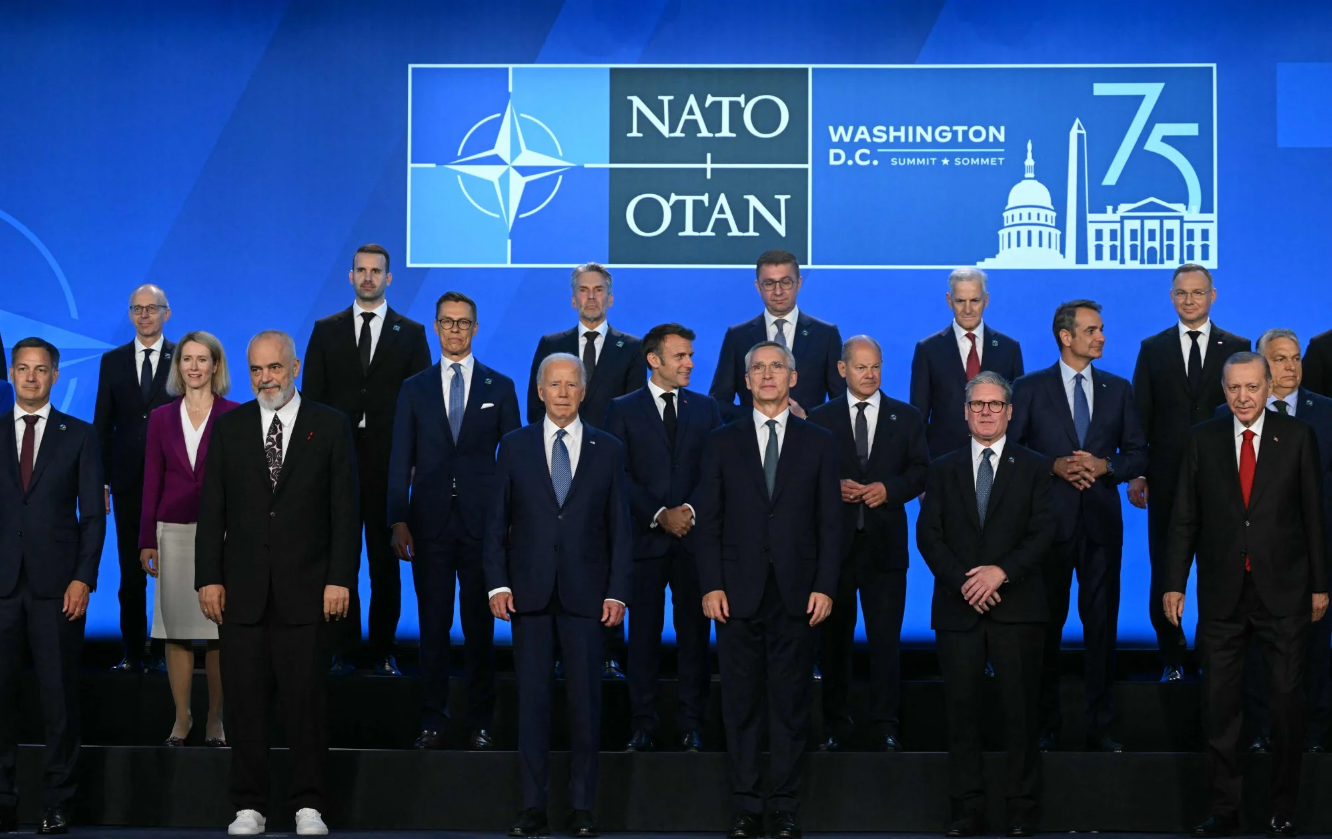
From July 9 to 11, NATO held its 75th-anniversary summit and published its Washington Summit Declaration. Against the complex backdrop of the protracted Russia-Ukraine conflict and fierce domestic wrangling in the U.S. presidential campaign, the commemorative summit was less a commemoration than a rallying call for a major offensive:
• First, ambiguity over Ukraine’s NATO membership. The Russia-Ukraine conflict was the core topic of the summit. Since the conflict broke out, Ukraine President Volodymyr Zelenskyy has repeatedly expressed his hope of joining NATO to win support under its collective defense clause. However, because of NATO’s concerns about Russia’s reaction, as well as opposition from some member countries, Ukraine has yet to receive a clear answer from the organization.
Instead, NATO added ambiguity by publishing a plan for Ukraine’s “bridge to membership” at the summit —a murky promise at best. NATO Secretary-General Jens Stoltenberg explicitly stated that Ukraine won’t join NATO immediately. To make sure Russia won’t invade it again, Ukraine must join after the war ends, he said. Joining NATO now would trigger the organization’s collective defense clause, which has the potential of bringing on a nuclear war between the West and Russia, and the West doesn’t want that to happen. Also, one of Russia’s preconditions for peace talks is that Ukraine not join NATO.
The idea of ending the war, followed immediately by Ukraine’s joining NATO, presents a logically contradictory pseudo-proposition. NATO’s assurance of a “bridge” only blurs the process further by postponing a decision.
• Second, an obvious tendency to expand NATO’s presence in the Asia-Pacific. In addition to leaders of the 32 existing NATO member countries, the leaders of Australia, Japan, South Korea and New Zealand were also invited to the summit. This was the third time the heads of the four nations had been invited over the past three years.
As extraregional countries, those four Asia-Pacific countries have virtually no connection to traditional NATO subjects. In his meeting with representatives of the four during this summit, U.S. President Joe Biden promised to enhance interconnectivity in Atlantic and Indo-Pacific security. Stoltenberg added that NATO and its Indo-Pacific allies and partners must cooperate “more closely” to cope with global challenges brought by Russia and China.
Japanese Prime Minister Fumio Kishida and South Korea’s President Yoon Suk Yeol agreed in a bilateral meeting that NATO’s Washington summit would promote further cooperation with “Indo-Pacific partners.” Kishida even said in an April speech during his U.S. visit that today’s Ukraine may be tomorrow’s East Asia. His attitude has been received well in the United States and Europe.
Japan has been even more proactive in consolidating cooperation with NATO. It has offered aid for Ukraine and is vying for a pioneering role in NATO involvement in the Asia-Pacific. The U.S. is intentionally broadening cross-Atlantic security topics, calling for major partner countries in the Asia-Pacific to participate and make NATO mechanisms serve the implementation of its Indo-Pacific Strategy and support its attempt to build new NATO-like mechanisms in the Asia-Pacific region.
• Third, an evident intent to vilify China. The summit for the first time made China challenges a priority subject, identifying China as the “decisive enabler” in the Russia-Ukraine conflict and pledging to make China pay for this. Disregarding the fact that China has been appealing for a peaceful solution to the conflict, the summit made extremely irresponsible, provocative statements about alleged Chinese assistance to Russia. Such allegations are an obvious attempt to pass the buck, which is certainly groundless.
For a long time there has been no direct conflict between NATO and China. Yet NATO has become increasingly provocative toward China in recent years. Since it identified China as a “systemic challenge” in 2022, NATO has continually taken advantage of the Russia-Ukraine conflict to press countries in Europe and the Asia-Pacific to take sides, preaching about a “China threat” and pitting China against the international order. The summit declaration’s stigmatization of China was an outcome of the U.S. attempt to create an imaginary enemy; to fan security anxiety in member countries and those in the region; to disengage China and Europe, hence consolidating the countries’ bonds with U.S. interests; and to serve the U.S. strategy for containing China.
A legacy of the Cold War, NATO was born to serve U.S. hegemony. Since the end of the Cold War, as a militarized tool of the U.S. alliance system, NATO has played a role incompatible with the times. For many years, it has single-mindedly proceeded with its eastward expansion, with membership growing from 12 countries to 32 today, in disregard of the interests and concerns of other countries in the region.
Regional security has not improved with NATO’s existence. On the contrary, Europe has been trapped in a permanent state of anxiety. Following the example of NATO’s eastward expansion, the U.S. now intends to create confrontation and division in the Asia-Pacific, hyping threats in the region and introducing NATO-style mechanisms to the area as it tries to build an Asian version of NATO.
Seventy-five years after its creation, NATO has obviously forgotten its original purpose. The Washington summit ignored the question of how to build European security mechanisms. NATO’s nature as a “defensive military organization” has changed thoroughly, and the organization has become an instrument of U.S. hegemony that creates confrontation in both the region and the world.
Following the U.S. lead in identifying China as a challenge shows Cold War thinking and ideological prejudice. The declaration’s statements about China are full of bias, stigma and provocation. Its allegations against China are groundless, and they mislead the international community. The present-day world needs a force for peace and stability.
